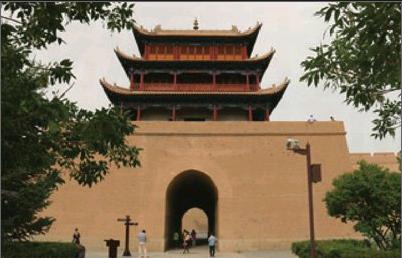Oasis City
2015-07-22ByJiJing
By+Ji+Jing

Cao Yue, a 43-year-old manager of the reception department of a travel agency in Jiayuguan, northwest Chinas Gansu Province, said that bananas were not part of her childhood memories for many years, until one day when her father brought back home the fruit with a shape that she thought resembled a human hand. The bananas were distributed to his father as a New Year gift by his factory.
In Caos city, which is surrounded by the Gobi Desert, fruits such as bananas that grow in south China used to be rare and precious. It was only in the 1980s that fruits from the south became available in the local market, thanks to the development of transportation and logistics systems.
This city is home to the famous Jiayu Pass. The ancient fort was built in the Ming Dynasty(1368-1644) and constitutes the western end of the Ming-era Great Wall, which stretches some 6,000 km.
Although the Jiayu Pass boasts a long history, Jiayuguan itself is a young city, established in 1965 for the purpose of housing employees of the then-flourishing Jiuquan Iron and Steel Group (known as Jiugang). Jiugang was set up in Jiayuguan in 1958 after an iron ore was discovered near the location three years previous.
In the 1950s and 1960s, a large number of young people from across China came to Jiayuguan to work for Jiugang. As a result, much of the citys population consists of immigrants from other parts of China. Caos parents belong to such a group.
Caos father came to Jiayuguan from nearby Shaanxi Province in 1968 after retiring from the army and became an electrician with Jiugang. Her mother who came from northeast Chinas Jilin Province after graduating from high school, was a saleswoman in a local department store.
“Many young people have come here in response to the governments call to help develop the western region, and they were enthusiastic about making the backward place richer,” Cao said. “However, the harsh natural conditions disappointed many.”
Jiayuguan has a dry climate because it receives a meager amount of rainwater throughout the year and experiences scorching temperatures in summer. The annual precipitation is only 85.3 mm but the annual evaporation can reach 2,149 mm.
In spite of the unfavorable natural conditions, Jiayuguan has developed rapidly over the past few decades through relying on the steel industry.
Compared with the early days of the city, Jiayuguans living environment has improved considerably. Cao recalled that when she was in primary school, there were frequent sandstorms in spring and no parks or green spaces in Jiayuguan. She would have to go to parks in nearby Jiuquan City in a coal truck with her classmates to celebrate International Childrens Day on June 1.
Better environment
“Now artificial lakes and parks are to be seen everywhere,” Cao said.
In order to make the city more liveable, the local government has built 13 large parks and 14 reservoirs in recent years. The green coverage rate has reached 38.77 percent, no mean feat for a city located in the Gobi Desert.
“We have invested about 200 million yuan ($32 million) in planting trees since 2009,” said Zheng Yajun, Secretary of the Jiayuguan Municipal Committee of the Communist Party of China.
Locals often compare the difficulty of growing a tree in the Gobi Desert to that of raising a child. The cost of planting a tree in Jiayuguan amounts to as much as 360 yuan ($58). As there is barely any soil in the Gobi Desert, one meters depth of sand and stones below the surface of the earth has to be dug out and replaced with fertile soil from other places before a tree is planted.
“Every year the over 200,000 local residents donate 300 ($48) to 400 yuan ($64) each to support the tree-planting endeavor of the government,” said Yang Wei, Vice Mayor of Jiayuguan.
Burgeoning tourism
With Jiayuguan becoming greener, local tourism has also experienced a boom.
The city has multiple advantages for developing tourism given its renowned historical sites and its location along the Silk Road, an ancient trade route between Asia and Europe. The Jiayu Pass was listed as a UNESCO cultural heritage site in 1987.
Jiayuguan is an intermediate joint connecting two provincial capitals, namely Lanzhou of Gansu and Urumqi of Xinjiang Uygur Autonomous Region. To its south lie the Qilian Mountains, a snow-capped landform that divides the provinces of Gansu and Qinghai. In fair weather, the mountains are visible in the distance, forming a backdrop to the city.
The Lanzhou-Xinjiang High-Speed Railway, which was put into operation last year, passes through Jiayuguan. It has made transportation to and from the city even more convenient.
The Silk Road Economic Belt initiated by Chinese President Xi Jinping in 2013 to facilitate trade and investment in Eurasia has provided Jiayuguan with fresh opportunities to reinvent itself. The Fifth Silk Road International Tourism Festival running from June 15 to July 15 in Jiayuguan represents one of the citys efforts to take advantage of the initiative.
“We will increase infrastructure connectivity with other countries and regions along the Silk Road in order to build Jiayuguan into an international tourism destination,” said Liu Peng, Mayor of the city.
Besides investing heavily in projects to protect the Jiayu Pass, the local government has built a peacock park and authorized Shenzhen-based Fantawild Holdings Inc. to build an amusement park to increase and diversify local tourist resources to keep visitors staying longer in the city.
Cao is pleased to see her hometown developing so rapidly. As a tour guide, she has had the opportunities to lead tourists in their travels around the country. In the process, she has encountered more fruits from south China, such as the pungent durian, and fallen in love with it. However, her hometown has always held a special allure for her. Compared with her parents who migrated from other locations of China in their 20s, Cao has grown up in the city and thus possesses a deeper affection for it.
“Whenever the train I board approaches Jiayuguan, I feel elated,” said Cao.
